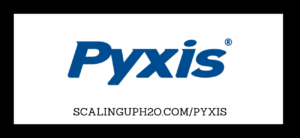“To find the most sensitive, accurate, reproducible, and reliable method for detecting and quantifying Legionella in a sample, qPCR is the best option.” – Michael Loewenstein
 In this much-anticipated episode highlighting the findings of Part 2 of Michael Loewenstein and Joe Benzinger’s study, Michael Loewenstein, Vice President of Scientific Consulting at Q Laboratories, returns to share their surprising discoveries. He offers valuable advice to water professionals on developing strategies for incorporating qPCR in a Water Management Plan (WMP). Join Trace Blackmore and Michael Loewenstein as they guide you through the latest advancements in Legionella detection methods, the nuances of traditional culture techniques versus modern qPCR, and the future of water management.
In this much-anticipated episode highlighting the findings of Part 2 of Michael Loewenstein and Joe Benzinger’s study, Michael Loewenstein, Vice President of Scientific Consulting at Q Laboratories, returns to share their surprising discoveries. He offers valuable advice to water professionals on developing strategies for incorporating qPCR in a Water Management Plan (WMP). Join Trace Blackmore and Michael Loewenstein as they guide you through the latest advancements in Legionella detection methods, the nuances of traditional culture techniques versus modern qPCR, and the future of water management.
What Are the Different Testing Methods for Legionella?
Michael elaborates on the two primary methods for Legionella testing: traditional culture techniques (ISO 11731) and qPCR. Culture methods, while widely used, take a significant amount of time (7 to 14+ days) to yield results. In contrast, qPCR offers faster and more sensitive detection, identifying the presence and quantity of Legionella DNA in a matter of hours.
Is There a “Gold Standard” for Legionella Testing?
The term “Gold Standard” often pops up in discussions about Legionella testing, but as Michael points out, no regulatory body has officially designated a single best method. While ISO 11731 is a trusted standard, Michael argues that qPCR provides a more reliable, accurate, and sensitive approach for detecting and quantifying Legionella in samples.
What Were the Findings from Phase 2 of His Study?
Michael shares findings from a two-phase study comparing cultural methods with PCR and qPCR. Phase 1 focused on method validation, confirming the efficacy of commercially available PCR methods. Phase 2 moved to real-world samples, revealing that qPCR detected Legionella in about 67% of samples, far surpassing the detection rates of traditional culture methods.
What Can qPCR Do and How Does It Differ from Culture Methods?
qPCR is a powerful tool in Legionella testing. Unlike culture methods that rely on colony-forming units, qPCR measures the number of DNA copies present in a sample, providing a clear picture of the Legionella population. It can also distinguish between viable and non-viable cells, making it a comprehensive and efficient method for routine monitoring.
How Would Michael Set Up His Water Management Plan (WMP)?
When asked how he would set up his water management plan, Michael emphasizes the importance of frequent testing. He advocates for the use of qPCR due to its speed and sensitivity. However, he cautions that those uncomfortable with detecting any Legionella might find qPCR overwhelming, as it tends to reveal a higher positivity rate than traditional methods.
How Does Pricing Compare Between Culture and qPCR Methods?Interestingly, Q Laboratories charges the same for both qPCR and culture methods. Despite higher costs for qPCR, it requires significantly less analyst time, making it a cost-effective choice for many labs.
What’s Next for Phase 3 of the Study?
The next phase of Michael’s study aims to explore additional factors such as UV light treatment. He encourages feedback from the community to ensure all relevant aspects are covered in the ongoing research.
How Can I Get Involved with the AOAC Legionella Working Group?
Please visit www.aoac.org/news/legionella-in-water-wg-volunteers-needed . If you would like to support this initiative or are interested in more information, please reach out to scienceprograms@aoac.org.
Michael’s key message is that qPCR is a viable, non-intimidating option for Legionella testing. He reassures listeners that the CDC does not mandate the use of culture methods exclusively. Embracing qPCR can lead to more accurate monitoring and better-informed water management decisions.
Until next Friday’s episode, stay curious, stay informed, and keep scaling up your Legionella knowledge!
Your roadside friends as you drive from client to client,
The Scaling UP! H2O Team
Timestamps
01:00 – Trace Blackmore invites you to check out our Legionella Resources page
03:28 – Upcoming Events for Water Treatment Professionals
05:00 – Interview with Michael Loewenstein, Vice President, Scientific Consulting at Q Laboratories
51:05 – Drop by Drop With James McDonald
Quotes
“PCR detects whether Legionella DNA is present, while qPCR not only confirms its presence but also measures the quantity of Legionella DNA in a sample.” – Michael Loewenstein
“The CDC does not say you have to use culture.” – Michael Loewenstein
“An increase in Legionella positivity with a qPCR test is a feature, not a bug.” – Michael Loewenstein
Connect with Michael Loewenstein
Phone: +1 513 207 4943
Email: MLoewenstein@qlaboratories.com
Website: Scientific Consulting for Q Labs LLC
LinkedIn: Michael Loewenstein
Read or Download Michael Loewenstein’s Press Release HERE
Links Mentioned
Ep 269
Ep 335
Read Michael Loewenstein’s technical paper HERE
The Rising Tide Mastermind
Scaling UP! H2O Academy video courses
Submit a Show Idea
Drop By Drop with James
In today’s episode, I have a “What If.” What if acid is overfed to a cooling tower system and drops the pH to a 3. You heard it correctly, the pH is now 3 in your cooling tower system. What damage is being done right now. How do you recover from this low pH excursion? Should you just turn off the acid feed and wait for the system pH to slowly return naturally? What could be the impact of this approach? Should you take immediate action and raise the pH as quickly as possible? What could be the impact of this approach? Should you increase blowdown? What caused the acid over feed? How could this be prevented in the future? What alarms could be setup? What do you communicate all this to the end user?
2024 Events for Water Professionals
Check out our Scaling UP! H2O Events Calendar where we’ve listed every event Water Treaters should be aware of by clicking HERE.

